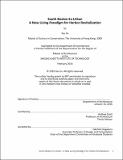South Boston ex-urban : a new living paradigm for harbor revitalization
Author(s)
Jin, You, M. Arch. Massachusetts Institute of Technology
DownloadFull printable version (36.16Mb)
Other Contributors
Massachusetts Institute of Technology. Department of Architecture.
Advisor
Andrew Scott.
Terms of use
Metadata
Show full item recordAbstract
All around the world, old harbor areas stood empty once the city maritime functions began to wane in the early twentieth-century. Due to the excellent views, the location on the water, and the proximity to the city center, these areas have been rapidly redeveloped to facilitate urban expansion in the last three decades. The overlap of industrial decline and new revitalization has prompted new issues. Living in the city and urban demographics are changing. On the macro-level, because of the emptiness of the newly developed site, the density is not comparable and is difficult to evaluate in its integrated context. On the micro-level, an urban apartment is highly efficient means to provide living containers for urban dwellers; however, it sacrifices high living quality to enjoy sunlight, fresh air, the view, and private garden to every housing unit. A single family house symbolizes a success of personal life; however, it compromises urban public space and usually is exclusive to social activities in a shared economic era. This thesis project addresses the issue of livability as part of the harbor revitalization in a transitional site of a rapid redevelopment district, empty industrial zones, and suburban residential areas. I aim to create a three-dimensional, micro-urban living system in which residential, commercial, recreational, educational functions are merged together.
Description
Thesis: M. Arch., Massachusetts Institute of Technology, Department of Architecture, 2016. This electronic version was submitted by the student author. The certified thesis is available in the Institute Archives and Special Collections. Cataloged from student-submitted PDF version of thesis. Includes bibliographical references (pages 94-95).
Date issued
2016Department
Massachusetts Institute of Technology. Department of ArchitecturePublisher
Massachusetts Institute of Technology
Keywords
Architecture.